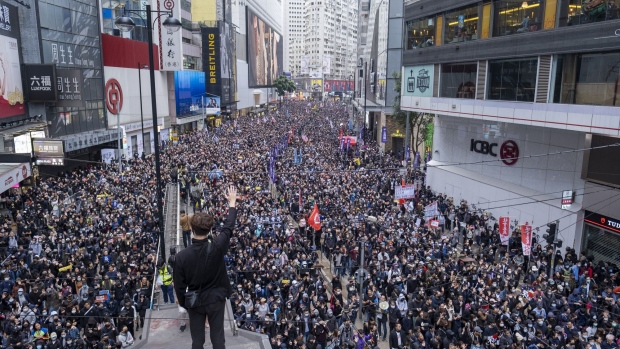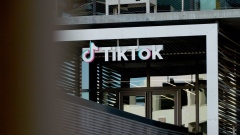Mar 4, 2021
China Moves to Curb Hong Kong Opposition’s Role in Elections
, Bloomberg News

(Bloomberg) -- Chinese lawmakers will advance a proposal to overhaul Hong Kong’s electoral system, according to Xinhua News Agency, pushing ahead with a controversial plan to limit the opposition’s ability to win public office in the Asian financial center.
The National People’s Congress will review a draft resolution on “improving Hong Kong’s electoral system” in the coming days, according to an agenda published Thursday by the official Xinhua News Agency. The rubber-stamp parliament is slated to begin a week-long series of annual meetings Friday in Beijing, meaning the measure could pass as soon as next week.
The action is the latest step by Chinese President Xi Jinping’s government to curb dissent in the former British colony following historically large and sometimes violent pro-democracy protests in 2019. The National People’s Congress imposed a sweeping national security law on the city last year and used it to arrest some 100 opposition figures, former lawmakers and activists, drawing criticism from business groups and sanctions from the U.S. government.
In recent weeks, Xi and other officials have called for further actions to ensure “patriots” govern Hong Kong and conducted meetings in the mainland city of Shenzhen to discuss changes to the election system. Among the scenarios being considered are plans to reduce the number of seats opposition groups and local tycoons hold on the 1,200-member committee that picks the city’s powerful chief executive, local media including the South China Morning Post have reported.
Washington Reaction
Kurt Tong, an Asia Group partner and former U.S. consul general to Hong Kong and Macau, said Beijing’s attempts to erode Hong Kong’s already-limited democracy were “likely to engender a reaction from Washington.” That could take the form of sanctions, specific statements or additional congressional action.
“The Congress is, at this point, even tougher on Hong Kong-related issues than even the administration,” Tong said in a Feb. 24 interview with Bloomberg Television. “The question is whether sanctions actually accomplish much in terms of impacting China’s behavior. Today, they haven’t really.”
China viewed the protests in Hong Kong as an attempt to stage a “color revolution” that poses a direct challenge to Chinese Communist Party rule. Chen Yixin, the secretary general of the party’s top legal body, vowed in January to “push forward implementation of the Hong Kong national security law” this year to “build an iron wall to safeguard the country’s political security.”
While the committee that elected Hong Kong Chief Executive Carrie Lam in 2017 has long been dominated by Beijing loyalists, opposition candidates made inroads with their landslide win in District Council elections just over a year ago. A chance to build on that success evaporated after the government delayed an election for the more prominent Legislative Council in September and the entire opposition was either disqualified or resigned en masse.
Subversion Conspiracy
Numerous district councilors and former lawmakers were among 47 opposition figures charged Sunday with “conspiracy to commit subversion,” in Hong Kong’s most dramatic use yet of the security law. They are being prosecuted over their roles in a primary vote in July that the government argues amounted to a subversive plot to paralyze the government.
Rita Fan, a former member of the NPC’s powerful Standing Committee, has called for replacing the 117 Election Committee seats held largely by pro-democracy district councilors with members of Chinese national bodies. Candidates for the 70-seat Legislative Council should also require nominations from the Election Committee, Fan said, the Standard newspaper reported.
Five citywide “superseats” on the Legislative Council should also be broken up, Fan said, a move that would deprive candidates of a chance to prove their popularity across the city of 7.5 million people. Separately, Hong Kong lawmaker Priscilla Leung proposed a “eligibility vetting committee” to screen candidates for public office.
©2021 Bloomberg L.P.







